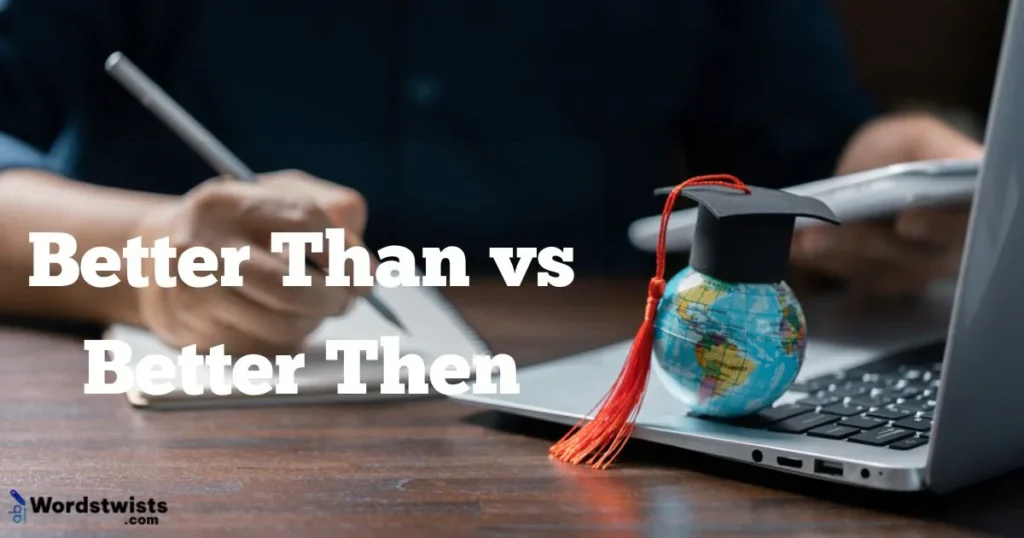Ever found yourself stuck wondering if it’s better than or better then? You’re not alone! This tiny mix-up can trip up even the best writers, making sentences confusing or just plain wrong. Understanding the difference between these two is super important for clear communication—whether you’re writing emails, essays, or chatting online.
Knowing when to use better than (a comparison) versus better then (a time-related phrase) helps you sound confident and professional. From my experience, this little grammar puzzle pops up way more than it should, so getting it right can save you from awkward moments. Ready to clear up this common confusion and boost your writing skills? Let’s dive in and unravel the mystery behind better than or better then!
Why “Better Then” is Almost Always Wrong (and How to Fix It)
Many people accidentally write “better then” when they actually mean “better than.” This mistake happens because than and then sound alike, but they serve very different roles in sentences. Than is a comparative conjunction used to compare two things. For example, “She is better than her brother at chess.” On the other hand, then is an adverb of time or sequence, like “Finish your homework, and then you can play.”
Using “better then” confuses the meaning because it mixes comparison with timing. The fix? Always think about what you’re trying to say. If you’re comparing two ideas or things, use better than. If you’re talking about what happens next or later, then is the right choice.
Example:
- Correct: “This cake tastes better than the one I made last week.”
- Wrong: “This cake tastes better then the one I made last week.”
Understanding this basic rule clears up the confusion and makes your writing stronger and clearer.
Real-Life Examples: When to Use “Than” vs “Then”
Imagine you’re texting a friend: “I’m feeling better then yesterday.” Does that sound right? Probably not! This is a classic example where than should be used instead of then. We use than for comparisons, like comparing how you feel today versus yesterday. Meanwhile, then is used to show what happens next or later.
Here are some real-life examples to clarify:
- “She runs faster than I do.” (comparison)
- “We ate dinner, and then watched a movie.” (sequence)
- “He’s better at math than science.” (comparison)
Knowing this difference helps avoid common mistakes and makes your sentences clearer. Remember, if you’re comparing two things, reach for than. If you’re talking about timing or order, then is your word.
Common Mistakes in Writing: Better Than or Better Then?
A very common error in writing is mixing up better than and better then. This usually happens because the words sound nearly the same, but their grammatical functions differ widely. Writers often use better then when they mean to compare, but it’s not grammatically correct.
For example, writing “This book is better then the last one” is incorrect. It should be “This book is better than the last one” because you are making a comparison. Using then here incorrectly suggests a timeline or sequence, which doesn’t fit the sentence’s meaning.
Remember, better than is used for comparisons, while better then is almost always wrong because it combines a comparison word with a time-related adverb incorrectly.
Examples of mistakes and corrections:
- Wrong: “She sings better then her sister.”
- Right: “She sings better than her sister.”
Avoid this slip-up to improve your grammar and clarity.
How Pronunciation Can Help You Choose Between Than and Then
Pronunciation might seem tricky because than and then sound very similar, but there’s a small difference that can help you pick the right word. Usually, than has a shorter, softer vowel sound (like “thən”), while then has a clearer “eh” sound (like “then”).
When you say the sentence aloud, listen closely to the vowel sound:
- “I like chocolate than vanilla.” (shorter “uh” sound)
- “Finish your work, and then we’ll play.” (clear “eh” sound)
This small pronunciation clue can guide your spelling. If you’re comparing two things, use than. If you’re talking about what happens next, use then. Practicing this out loud can make the choice easier, especially when writing quickly or texting.
The Role of Context: Understanding When to Use Than or Then
Context is everything when choosing between than and then. These words have distinct jobs in sentences, and the surrounding words usually give a clear hint. If the sentence compares two things, like scores, sizes, or qualities, than fits best. But if the sentence talks about time or what happens next, then is the correct choice.
Consider these examples:
- “She is taller than her brother.” (comparison context)
- “We will leave at noon, and then head to the park.” (time sequence context)
If you find yourself unsure, ask: Am I comparing two ideas or talking about a sequence? This quick check helps avoid common mistakes.
Context clues are your best tool to master this grammar difference and keep your writing clear and professional.
Better Than vs Better Then in Spoken English
In everyday speech, many people say “better then” by mistake because the words sound nearly identical. While this might not cause confusion when talking, it can lead to errors in writing. Spoken English often blurs the lines between than and then, but in writing, the distinction is crucial.
For example, someone might say, “I feel better then yesterday,” but the correct sentence is, “I feel better than yesterday.” The pronunciation can make it sound almost the same, so speakers should pay extra attention when writing to avoid mixing these words up.
Understanding this difference improves both your speaking clarity and writing skills. It’s a small grammar habit that makes a big difference when you want to sound polished and professional.
How Autocorrect Can Lead to “Better Then” Errors
Autocorrect can be a sneaky cause of the “better then” mistake. Sometimes, your phone or computer might automatically change than to then because then is more common in certain contexts. This can confuse writers who rely too much on autocorrect without double-checking.
For example, typing “She is better than me” might get changed to “She is better then me,” which is incorrect. This error happens because autocorrect programs often prioritize then as a valid word, even if the sentence calls for than.
To avoid this, always proofread your messages or documents. If you notice “better then,” stop and ask if you’re comparing two things (then it should be than). Being aware of this common autocorrect trap will help you keep your writing clear and error-free.
Using “Better Than” in Formal vs Informal Writing
In formal writing, like essays, reports, or emails, using better than correctly shows your attention to grammar and professionalism. Mixing up better than with better then can make your work look careless or confusing.
For example, in a formal sentence: “The new design is better than the previous version.” Here, than clearly shows a comparison. Using then instead would be incorrect.
In informal writing, such as texting or casual emails, people often overlook this difference, but it’s still best to use the correct form. Writing “better than” correctly helps you communicate clearly and makes a good impression, whether you’re at school, work, or chatting with friends.
Always remember, better than is the right choice for comparisons, no matter the writing style. It’s a simple step toward clear and effective communication.
Read More: Since vs Sense – Difference, Meaning & Usage Guide
Historical Origins: Where Do Than and Then Come From?
It’s easy to confuse than and then today, but their roots explain why they’re so different. Both words come from Old English, but they served separate roles even back then. Than came from the word þanne or þan, which was used to make comparisons—just like we do now. Meanwhile, then came from þænne, which referred to time and sequence, such as “after that.”
This history explains why than is a comparative conjunction, helping us compare two things: “This book is better than that one.” On the other hand, then is a sequence adverb, used for steps or events in time: “We’ll eat lunch, and then go outside.”
Understanding the roots of these two words makes it easier to remember their proper roles. Even though they sound similar, their meanings have been different for centuries—and they still are!
Read More: Cancelation or Cancellation – What’s the Difference?
How to Teach Kids the Difference Between Then and Than
Teaching kids the difference between than and then doesn’t have to be boring! Start with real-life examples and simple rules. Explain that than is used to compare things—like saying “ice cream is better than broccoli.” On the other hand, then talks about what happens next, like “We’ll eat, then go to the park.”
Make it fun with a comparison game:
- “Which is faster: a bike or a car?” → “A car is faster than a bike.”
- “What do we do after dinner?” → “We brush our teeth, then go to bed.”
Visuals help too! Use flashcards, cartoons, or even puppets acting out the difference between timeline words and comparison words.
From my classroom experience, using stories and playful language practice helps kids make the connection faster—and remember it longer!
Better Than or Better Then: Quick Quiz to Test Your Knowledge
Ready to test your grammar skills? Let’s see how well you know when to use better than and better then. Choose the correct word in each sentence:
- “Pizza is better ___ salad.”
A) than B) then - “First we’ll clean up, ___ we can watch TV.”
A) than B) then - “My grade was higher ___ his.”
A) than B) then - “We’ll go to the store, and ___ head home.”
A) than B) then
Answers:
- A) than (comparison)
- B) then (sequence)
- A) than (comparison)
- B) then (timeline)
This quick grammar quiz shows how easily the wrong word can slip in. Practice makes perfect—and now you’re one step closer to mastering this tricky homophone pair.
Visual Mnemonics to Remember Than vs Then Easily
If you mix up than and then, a simple picture trick might help! Think of than as a scale or balance—something you use to compare two things. Now picture then as a clock or timeline, showing the order of events.
Mnemonic tip:
- THAN = Compare A vs N
- THEN = E for Events or time
Here’s another way:
- “Better than” compares. Picture a gold medal next to a silver one.
- “Better then” is wrong—unless you’re saying something like, “We’ll do better, then try again.”
Visual learners especially benefit from these memory hooks. Drawing a little chart or timeline beside your notes can really lock the meaning in.
With a fun visual, you can easily remember which word does what—and stop second-guessing your writing.
Why “Better Then” Sounds Right but Isn’t
You’ve probably said or heard “better then” in conversation, and it didn’t sound wrong at all. That’s because than and then are homophones, which means they sound very similar when spoken. In fast speech, the “a” in than often sounds like the “e” in then, making them easy to mix up.
But in writing, they’re not interchangeable. “Better than” is correct when you’re comparing. Saying “better then” might sound okay, but it creates confusing grammar on the page.
Example:
- Wrong: “He’s better then her at soccer.”
- Right: “He’s better than her at soccer.”
The fix? Read your sentence out loud and ask, “Am I comparing two things?” If yes, use than, even if your ears lean toward then. Don’t let sound fool your sentence structure!
How Grammar Tools Handle Better Than and Better Then
Grammar tools like Grammarly or Microsoft Editor are great—but they don’t always catch everything. These programs usually flag major errors, but sometimes “better then” slips through because then is a real word, just not the right one for comparisons.
For instance, if you type: “This laptop is better then that one,” your spell-check might stay silent. Why? Because “then” is spelled correctly and used often—just not in this context.
That’s why knowing grammar rules is more reliable than depending on tools alone. A grammar checker is helpful, but it can’t always catch homophone confusion or misused comparisons.
My advice: always reread your sentences and look for meaning. If it’s a comparison, you need than. If it’s about time or sequence, go with then. Use tools as support—but not as a substitute for grammar knowledge!
Better Than vs Better Then: Which Is More Common in English?
A quick look at English usage shows that better than is far more common—and more correct—than better then. That’s because “better than” fits the grammar rule for comparative structures, which we use all the time: comparing food, people, performance, grades, and more.
“Better then” only makes sense if you’re combining “better” with a time statement, like:
- “I studied more, and I got better. Then, I passed the test.”
But writing “She’s better then her friend” is wrong—and yet still pops up a lot online.
In digital writing, autocorrect mistakes, voice-to-text tools, and even hasty typing make “better then” errors more common than they should be. But grammar-wise, “better than” wins by a long shot—both in accuracy and frequency.
Better Then: Common Mistakes in 2026 Writing Trends
Many people mistakenly use “better then” instead of “better than”. This error shows up a lot in casual writing, social media posts, and even some content in 2026. The word “then” refers to time or sequence (e.g., “We went to the store, then we ate lunch”), whereas “than” is used for comparisons (e.g., “She is better than him at chess”).
In 2026, as digital content continues to grow, this confusion is especially common in:
- Social media captions where speed matters
- AI-generated text that hasn’t been proofread
- Blog posts and newsletters rushed for publication
- Student writing and online exams where grammar accuracy is critical
Tip: Always check if you’re making a comparison (use “than”) or talking about time/sequence (use “then”). Misusing it can make your writing look unprofessional or confusing.
Conclusion
To wrap up, the key difference between better than and better then lies in their purpose: better than is used for clear comparisons, while then relates to the sequence of events or timing. Mastering this simple but important grammar rule helps you write with confidence and avoid confusing mistakes. From my experience teaching language, once you understand this difference, you’ll spot errors quickly and fix them easily.
Remember, clear writing comes from knowing the right words for the right situation. So next time you’re unsure, just pause and ask yourself, “Am I comparing, or talking about what happens next?” Keep practicing, and soon enough, you’ll never mix up better than and better then again. Go ahead—write with clarity and confidence!

I’m Leo Knox, the wordplay wizard behind WordsTwists.com where I turn everyday meanings into funny, clever, and creative twists. If you’re tired of saying things the boring way, I’ve got a better (and funnier) one for you!


